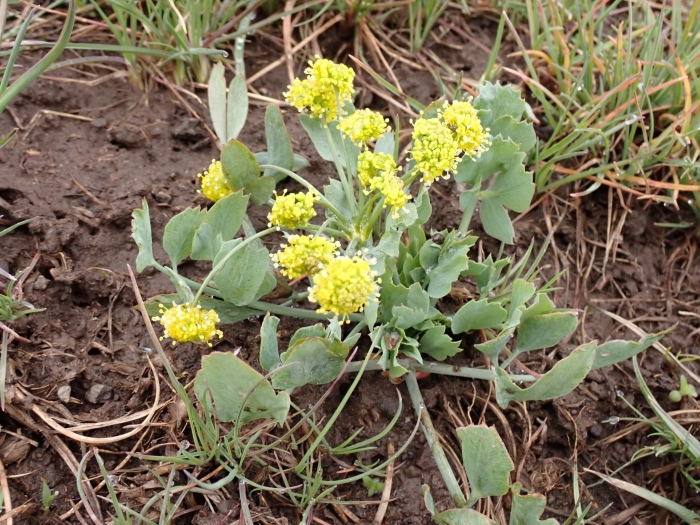Pestle Lomatium
(Lomatium nudicaule)
Pestle Lomatium (Lomatium nudicaule)
/
/

John Brew
CC BY 4.0
Image By:
John Brew
Recorded By:
Copyright:
CC BY 4.0
Copyright Notice:
Photo by: John Brew | License Type: CC BY 4.0 | License URL: http://creativecommons.org/licenses/by/4.0/ | Rights Holder: John Brew | Publisher: iNaturalist | Date Created: 2022-05-01T05:52:46-07:00 |
























Estimated Native Range
Summary
Lomatium nudicaule, commonly known as pestle lomatium, barestem biscuitroot, Indian celery, or Indian consumption plant, is a perennial herb native to a variety of habitats including open woodlands, grasslands, and rocky outcrops in western North America, from British Columbia to California and east to Utah. It typically grows up to 28 inches tall and is characterized by its thick taproot and basal leaves that emerge directly at ground level. The plant’s foliage is made up of waxy, lance-shaped leaflets, and during its flowering season in spring, it produces conspicuous umbels of yellow or purplish flowers that are attractive to pollinators.
Lomatium nudicaule is valued for its historical and ongoing use by Native American groups for food and medicinal purposes, including treatments for tuberculosis and as a throat remedy for singers during ceremonies. The seeds are also used culturally, being burned as incense. In cultivation, it is appreciated for its drought tolerance and can be used in native plant gardens, rock gardens, and restoration projects. It prefers full sun to part shade and thrives in well-drained soils. While generally low-maintenance, it can be susceptible to root rot in overly wet conditions.CC BY-SA 4.0
Lomatium nudicaule is valued for its historical and ongoing use by Native American groups for food and medicinal purposes, including treatments for tuberculosis and as a throat remedy for singers during ceremonies. The seeds are also used culturally, being burned as incense. In cultivation, it is appreciated for its drought tolerance and can be used in native plant gardens, rock gardens, and restoration projects. It prefers full sun to part shade and thrives in well-drained soils. While generally low-maintenance, it can be susceptible to root rot in overly wet conditions.CC BY-SA 4.0
Plant Description
- Plant Type: Herb
- Height: 1.5-2.5 feet
- Width: 0.5-1 feet
- Growth Rate: Slow, Moderate
- Flower Color: Yellow
- Flowering Season: Spring, Summer
- Leaf Retention: Deciduous
Growth Requirements
- Sun: Full Sun
- Water: Medium, High
- Drainage: Medium, Fast
Common Uses
Edible*Disclaimer: Easyscape's listed plant edibility is for informational use. Always verify the safety and proper identification of any plant before consumption., Low Maintenance
Natural Habitat
Open woodlands, grasslands, and rocky outcrops
Other Names
Common Names: Indian Celery, Naked-Stem Lomatium, Pestle Lomatium, Bare-Stemmed Desert-Parsley, Indian Consumption Plant, Bare-Stemmed Biscuitroot, Barestem Desert Parsley, Naked-Stemmed Desert-Parsley
Scientific Names: , Lomatium nudicaule, Cogswellia nudicaulis, Ferula nudicaulis, Ferula nuttallii, Leptotaenia dissecta, Lomatium nudicaulis, Pastinaca nudicaulis, Peucedanum nudicaule, Peucedanum robustum
GBIF Accepted Name: